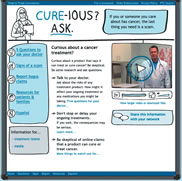Scams Exposed
Site offers sound advice on phony cancer cures

Learn more about herbs and nutritional supplements by viewing our Information Guide [PDF].
For as long as there is sickness, there will be snake-oil salesmen. It's sad to think anyone would take advantage of people who are facing cancer, but it happens. That's why the federal trade commission has established a new web site to help people spot cancer-related scams.
The site, www.ftc.gov/curious, offers sound advice for identifying and reporting bogus products that claim to cure cancer. Douglas Blayney, M.D., said the single best thing you can do when questions arise about supplements or alternative treatments is talk to your health-care team.
"A lot of patients are reluctant to tell their doctors what supplements they're taking, or they forget," he said. "But it's extremely important."
Supplements may interfere with cancer treatment, diminishing a drugs effects or making it toxic, he said. This is also true of prescription medications and legitimate nutritional supplements -- which is why it's essential to keep your health-care team informed.
Even cancer scams that do no physical harm exploit people at their most vulnerable moments, conning them out of money for ineffective, unproven products.
"Almost everyone who works here in the Rogel Cancer Center has been personally touched by cancer -- whether they've battled the disease themselves or watched a close family member or friend go through it," Blayney said. "If these products worked and there truly was an easy cure for cancer, we wouldnt be hiding it."
Signs of a Cancer Scam
Here's a sample of what you'll find on the Federal Trade Commission's new Web site, www.ftc.gov/curious

![]() No one treatment works for every cancer or every person; be skeptical of products that make broad claims to treat cancer.
No one treatment works for every cancer or every person; be skeptical of products that make broad claims to treat cancer.
![]() Natural doesn't mean effective -- or safe.
Natural doesn't mean effective -- or safe.
![]() Bogus marketers use trickery and vague language. Testimonials may be fake -- and even if they aren't, one person's story may have nothing at all to do with your cancer diagnosis.
Bogus marketers use trickery and vague language. Testimonials may be fake -- and even if they aren't, one person's story may have nothing at all to do with your cancer diagnosis.
![]() Scammers may use big words from a medical dictionary to sound impressive. But what does it really mean? Ask your doctor for the plain-language translation.
Scammers may use big words from a medical dictionary to sound impressive. But what does it really mean? Ask your doctor for the plain-language translation.
![]() A money-back guarantee doesn't mean a product works.
A money-back guarantee doesn't mean a product works.
Read the Winter, 2009 issue of Thrive.
